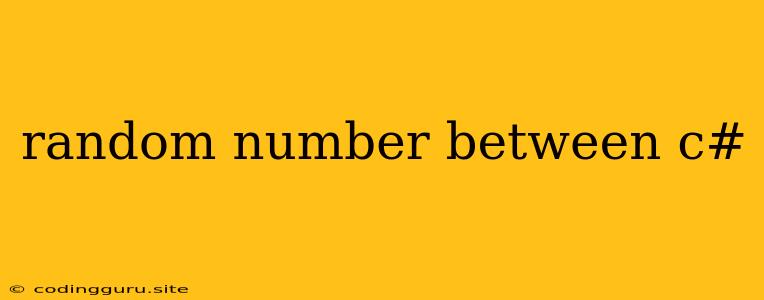Generating Random Numbers in C#
Generating random numbers is a common task in programming, especially when you need to simulate real-world events, create games, or perform data analysis. In C#, you can use the Random class to generate random numbers. This article will guide you through the process of generating random numbers in C# and explore various ways to customize the output.
Why Use Random Numbers?
You might be wondering why you would need to generate random numbers in your C# projects. Here are some common use cases:
- Simulating Real-World Events: Random numbers can be used to simulate events like dice rolls, coin flips, or random user behavior.
- Game Development: Random numbers are essential for creating engaging and unpredictable games. Think about dice rolls in board games, card shuffling, or enemy movements.
- Data Analysis and Modeling: Random number generation is used in various statistical and machine learning algorithms to simulate data and test hypotheses.
- Security: Random numbers are crucial for creating unique identifiers, passwords, and encryption keys, enhancing security and privacy.
Generating Random Integers
The most common way to generate random numbers in C# is using the Random class. Here's a basic example of generating a random integer between 0 (inclusive) and 10 (exclusive):
Random random = new Random();
int randomNumber = random.Next(10);
Console.WriteLine(randomNumber);
This code will print a random integer between 0 and 9 to the console.
Explanation:
Random random = new Random();creates a new instance of theRandomclass.random.Next(10);generates a random integer between 0 (inclusive) and 10 (exclusive). This means the possible results are 0, 1, 2, 3, 4, 5, 6, 7, 8, and 9.
Generating Random Numbers Within a Specific Range
You can also generate random numbers within a specific range by specifying the minimum and maximum values:
Random random = new Random();
int randomNumber = random.Next(5, 15); // Generates a number between 5 (inclusive) and 15 (exclusive)
Console.WriteLine(randomNumber);
This will print a random integer between 5 and 14.
Generating Random Decimal Numbers
To generate random decimal numbers, you can use the NextDouble() method:
Random random = new Random();
double randomNumber = random.NextDouble(); // Generates a number between 0.0 (inclusive) and 1.0 (exclusive)
Console.WriteLine(randomNumber);
This will print a random decimal number between 0.0 and 0.999999...
To generate a random decimal number within a specific range, you can combine NextDouble() with multiplication and addition:
Random random = new Random();
double randomNumber = random.NextDouble() * (100 - 50) + 50; // Generates a number between 50 (inclusive) and 100 (exclusive)
Console.WriteLine(randomNumber);
This will generate a random decimal number between 50.0 and 99.9999...
Handling Multiple Random Number Generations
If you need to generate multiple random numbers in quick succession, it's important to create a single instance of the Random class and reuse it. Creating a new instance for each random number generation can result in repeated or predictable sequences, especially if the time interval between generations is very short.
Random random = new Random();
for (int i = 0; i < 10; i++)
{
int randomNumber = random.Next(100);
Console.WriteLine(randomNumber);
}
Seeding the Random Number Generator
The Random class uses a seed to initialize its internal state. By default, it uses the system clock as the seed, resulting in different random numbers every time you run your program. However, if you need the same sequence of random numbers for testing or reproducibility, you can provide a specific seed value:
Random random = new Random(12345); // Uses 12345 as the seed
int randomNumber = random.Next(10);
Console.WriteLine(randomNumber);
By providing the same seed value, you'll get the same sequence of random numbers every time you execute this code.
Generating Random Numbers of Specific Data Types
The Random class primarily generates integers and doubles, but you can use its methods to create random numbers of other data types:
- Random String:
Random random = new Random();
string randomString = "ABCDEFGHIJKLMNOPQRSTUVWXYZ".ToCharArray()
.OrderBy(s => random.Next())
.Take(10)
.Aggregate(string.Empty, (a, b) => a + b);
Console.WriteLine(randomString);
This code generates a random string of 10 characters.
- Random Enum Value:
Random random = new Random();
public enum DaysOfWeek { Monday, Tuesday, Wednesday, Thursday, Friday, Saturday, Sunday };
DaysOfWeek randomDay = (DaysOfWeek)random.Next(Enum.GetValues(typeof(DaysOfWeek)).Length);
Console.WriteLine(randomDay);
This code generates a random value from the DaysOfWeek enum.
Conclusion
The Random class in C# provides a powerful tool for generating random numbers of various data types and within specific ranges. Understanding the concepts of seeding and reusing instances can help you control the generation of random numbers for your applications. Whether you're building games, simulating real-world events, or performing data analysis, generating random numbers in C# gives you the flexibility to add dynamism and unpredictability to your programs.
